|
|
|
Sort Order |
|
|
|
Items / Page
|
|
|
|
|
|
|
| Srl | Item |
| 1 |
ID:
114567


|
|
|
|
|
| Publication |
2012.
|
| Summary/Abstract |
This article raises questions about the possible waning of the authority of the diagnosis of posttraumatic stress disorder (PTSD). While avoiding predictions, it points to signs that the authority of PTSD is now being challenged by both the rise of resilience-based models and the increasing authority of biomedical and neurological approaches in the governance of trauma. It explores these challenges in various empirical sites, including humanitarian interventions, Western military settings (especially involving the US Army and North Atlantic Treaty Organization [NATO]), as well as civilian contexts, including national health services, emergency preparedness, schools, universities, and other sectors. The article concludes by stressing some of the troubling politics that surround these new developments, which, like the diagnosis of PTSD, may individualize and govern the experience of traumatic events, including war, in a broad context of social and economic austerity.
|
|
|
|
|
|
|
|
|
|
|
|
|
|
|
|
| 2 |
ID:
114565
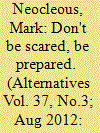

|
|
|
|
|
| Publication |
2012.
|
| Summary/Abstract |
Rather than concerning ourselves with "governing trauma" we should instead be concerned with how trauma has come to govern us. Trauma talk now comes naturally, and the article explores what all this trauma talk might be doing, ideologically and politically, especially in the context of the relationship between security and anxiety. The management of trauma and anxiety has become a way of mediating the demands of an endless security war: a war of security, a war for security, a war through security. The article therefore seeks to understand the concept of trauma and the proliferation of discourses of anxiety as ideological mechanisms deployed for the security crisis of endless war; deployed, that is, as a training in resilience. Trauma is less an issue of memory or the past and more a question of building resilience for the future. The language of trauma and anxiety, and the training in resilience that is associated with these terms, weds us to a deeply conservative mode of thinking.
|
|
|
|
|
|
|
|
|
|
|
|
|
|
|
|
| 3 |
ID:
114571
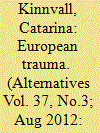

|
|
|
|
|
| Publication |
2012.
|
| Summary/Abstract |
This article examines the unfolding of traumas as structural and sociopsychological narratives focused on the bordering of identity and the governing of past present and future. Proceeding from a Lacanian conception of trauma and a Foucauldian understanding of governmentality, the analysis is centered on hegemonic counternarratives, even crises, involving the bordering of both Islam/Muslim identity and Europe/national identity. This "European trauma," or psychological moment, is exemplified through events in London 2005 and Norway 2011. It is perceived in terms of Chosen Traumas and Chosen Glories, the mythologization of past events that are retold, reinvented, and awarded new meanings in the present. Such traumas and glories can create a foundation for governing practices in which hegemonic interpretations of identity turn into normalizing narratives that justify violence. However, the governing of narratives is a contested process and alternative narrative understandings in terms of everyday practices can stimulate social resistance and psychological resilience, eventually challenging the normalizing bordering processes encountered in Europe today.
|
|
|
|
|
|
|
|
|
|
|
|
|
|
|
|
| 4 |
ID:
114569
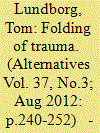

|
|
|
|
|
| Publication |
2012.
|
| Summary/Abstract |
This article examines the government of trauma by examining the rebuilding of Ground Zero as a practice of folding the traumatic event, of capturing the traumatic event by containing it within the forms of what can be said and what can be seen. Something always goes missing in this process: the ungraspable and inexpressible dimension of trauma, which ultimately resists capture. On this basis, it considers different architectural designs and proposals as expressions of different strategies of folding the traumatic event. One strategy seeks to capture and contain the traumatic event through the production of specific forms of seeing and speaking in the social field. A second strategy points to our inability to capture the traumatic event through folding. The conclusion considers how these two strategies can be used to analyze the political significance of architecture in the discourses of the war on terror.
|
|
|
|
|
|
|
|
|
|
|
|
|
|
|
|
| 5 |
ID:
114564


|
|
|
| 6 |
ID:
114568
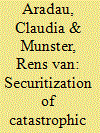

|
|
|
|
|
| Publication |
2012.
|
| Summary/Abstract |
Psychological knowledge has become incorporated into a range of security practices, discourses, and interventions in catastrophic events, including terrorism. By engaging the existing literature on the medicalization and psychologization of security, this article reads the enactment knowledge deployed in preparedness exercises from the perspective of psychodrama and sociodrama rather than that of psychoanalysis or psychosocial risk management. Enactment has become an important mode of knowledge for the governance of terrorism, as preparedness exercises deploy action methods, drama, enactment, and performance to prepare for unexpected, catastrophic events. Taking seriously the conceptualization of enactment, as deployed in psychodrama and sociodrama, can also challenge the securitization of catastrophic events. The article concludes that enactment, which foregrounds action rather than speech, and suggests that meaning follows action, can also offer critical insights into securitization theory.
|
|
|
|
|
|
|
|
|
|
|
|
|
|
|
|
| 7 |
ID:
114570


|
|
|
|
|
| Publication |
2012.
|
| Summary/Abstract |
The "act of terror" in Mumbai in November 2008 has been widely regarded as "India's 9-11." This article proposes that the proper setting of the "Mumbai attacks" is neither provided by what occurred in New York in 2001 nor by accentuating how the event engaged an audience of "distant others." It is, similarly, not made sufficiently comprehensible through representations of Mumbai as the most cosmopolitan space in India and of India as "shining." It, rather, consists in the violent founding of the Indian Republic and the traumatizing and traumatic vision that was inscribed through and into it. Such an alternative rendering of the "Mumbai attacks" offers a critical purchase on the notion of "governing traumatic events." It also situates the analysis in the tension between assumptions about an immanence of trauma and depictions of trauma as eruption and (dis)rupture. While the independence of India equals the traumatic in its function as a founding act or moment, the "Mumbai attacks" ought to be regarded as confirmation of reified and presently hegemonic forms of political life.
|
|
|
|
|
|
|
|
|
|
|
|
|
|
|
|
| 8 |
ID:
114566
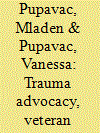

|
|
|
|
|
| Publication |
2012.
|
| Summary/Abstract |
This article considers international trauma advocacy and Croatian veteran politics. The article begins by discussing international trauma advocacy and therapeutic state legitimation. International trauma advocacy seeks to promote peace, however unwittingly it has legitimized veteran politics antithetical to its ideals. The second half of the article goes on to consider Croatian state legitimation and privileged veteran pensions. The article suggests that Croatia is developing therapeutic forms of state legitimation. The article highlights the problems of Croatia as a therapeutic state and its recognition of extensive veteran privileges. The article concludes that the veteran privileges represent a political, social, and economic burden which is hindering Croatia's postconflict development.
|
|
|
|
|
|
|
|
|
|
|
|
|
|
|
|
|
|
|
|
|